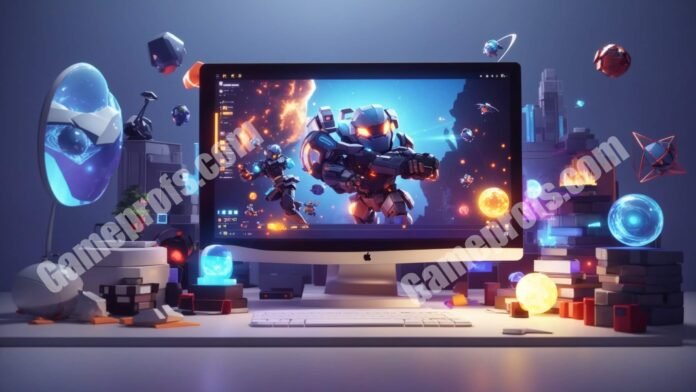Introduction
In the dynamic and ever-evolving world of video games, the role of a video game artist is crucial for creating immersive and visually stunning gaming experiences. If you have a passion for art and a love for gaming, pursuing a career as a video game artist might be the perfect fit for you. This comprehensive guide will walk you through the essential steps and skills required to embark on this exciting journey and carve out a successful career in the realm of video game artistry.
Understanding the Role of a Video Game Artist
Before diving into the specifics of becoming a video game artist, it’s crucial to understand the multifaceted nature of the role. Video game artists are responsible for creating visual elements that constitute the game’s graphics, including characters, environments, objects, animations, and special effects. They collaborate closely with designers, programmers, and other artists to ensure that the visual aspects align with the game’s overall vision and gameplay mechanics.
Developing Artistic Skills
The foundation of a successful career as a video game artist lies in honing your artistic skills. Start by mastering traditional art fundamentals such as drawing, painting, and sculpting. Experiment with different mediums and styles to broaden your creative repertoire. Additionally, focus on digital art techniques using software tools like Adobe Photoshop, Autodesk Maya, Blender, or ZBrush, which are commonly used in the game development industry.
Specializing in a Niche
Video game art encompasses various specialties, including character design, environment art, concept art, 2D/3D modeling, texturing, animation, and visual effects. While it’s essential to have a broad understanding of these disciplines, consider specializing in one or two areas where your talents and interests align. Specialization allows you to develop expertise and stand out in a competitive field.
Building a Strong Portfolio
A compelling portfolio is your ticket to showcasing your skills and landing opportunities in the video game industry. Curate a diverse selection of your best artwork, focusing on quality over quantity. Include a mix of personal projects, fan art, and pieces that demonstrate your proficiency in your chosen specialty. Tailor your portfolio to highlight your versatility, creativity, and attention to detail.
Gaining Technical Proficiency
In addition to artistic talent, video game artists need to be proficient in various technical skills related to game development. Familiarize yourself with industry-standard software and tools used for modeling, texturing, rigging, animation, and rendering. Stay updated on emerging technologies and techniques to remain competitive in the ever-evolving landscape of game development.
Pursuing Formal Education
While not always necessary, pursuing formal education in art, animation, or game design can provide valuable training and networking opportunities. Consider enrolling in a degree program or attending specialized art schools, workshops, or online courses focused on video game art and design. Take advantage of mentorship programs and internships to gain practical experience and industry insights.
Networking and Collaboration
Networking is an essential aspect of building a successful career in the video game industry. Attend industry events, conferences, and meetups to connect with fellow artists, game developers, recruiters, and potential employers. Engage with online communities, forums, and social media platforms to share your work, seek feedback, and stay informed about industry trends. Collaboration with other artists and developers on projects can also enhance your skills and visibility within the industry.
Continuing Education and Growth
The field of video game development is constantly evolving, with new technologies, trends, and techniques emerging regularly. To stay relevant and competitive, commit to lifelong learning and professional development. Take advantage of online tutorials, workshops, masterclasses, and mentorship programs to expand your skills and knowledge base. Embrace feedback and critiques as opportunities for growth and improvement.
Persistence and Adaptability
Building a successful career as a video game artist requires patience, perseverance, and adaptability. The journey may be challenging, with setbacks and rejections along the way, but remain steadfast in pursuing your goals. Adapt to changes in technology, market demands, and industry trends, and be open to exploring new opportunities and experiences that can propel your career forward.

Top Online Education Platforms for Learning How to Become a Video Game Artist
The world of video game artistry is dynamic and ever-evolving, and the demand for skilled professionals is on the rise. For those aspiring to become video game artists, online education platforms offer a flexible and accessible way to acquire the necessary skills. In this article, we’ll explore the top online education platforms where you can learn how to become a video game artist, providing a comprehensive guide for enthusiasts looking to turn their passion into a career.
Udemy
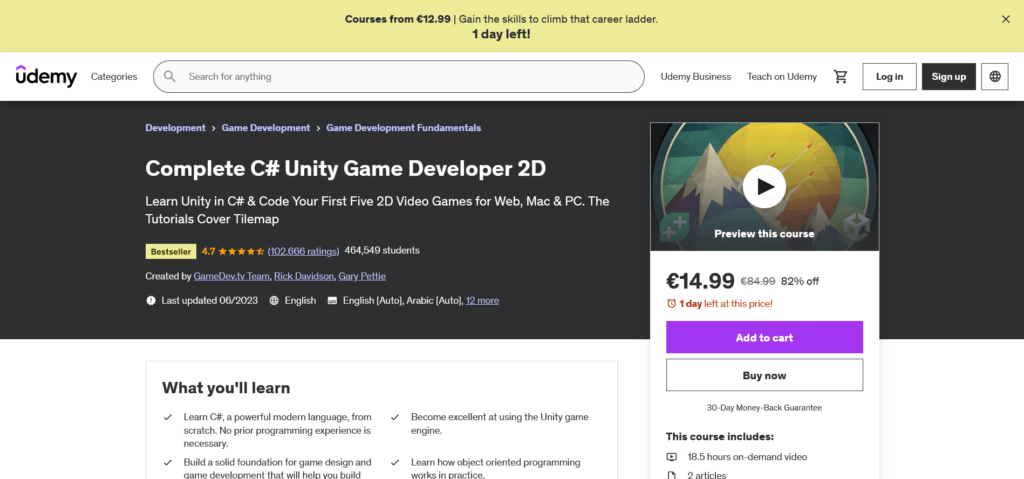
Udemy is a popular online learning platform that offers a wide range of courses for aspiring video game artists. From fundamental drawing skills to advanced 3D modeling techniques, Udemy provides affordable and diverse courses taught by industry experts. Students can learn at their own pace and access lifetime course materials.
Coursera
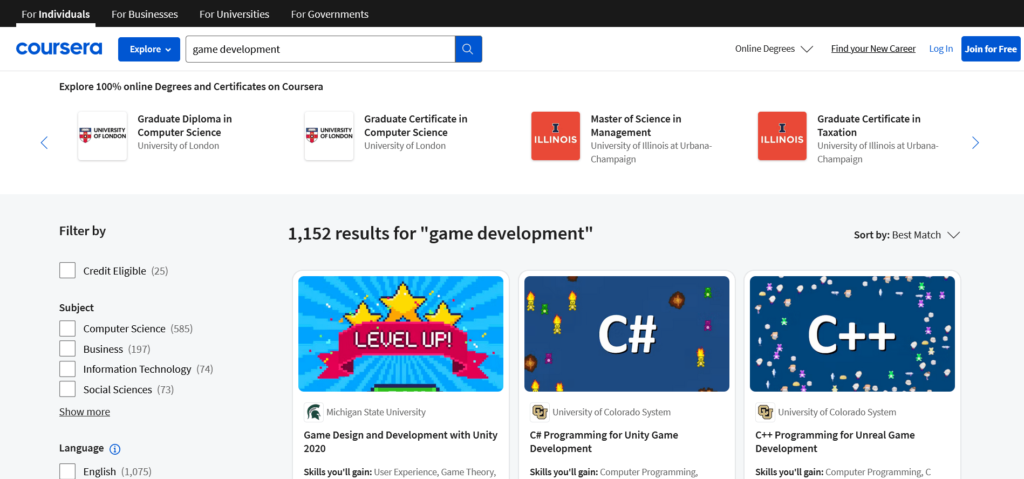
Coursera collaborates with top universities and institutions worldwide, offering high-quality courses in digital art, animation, and game design. Learners can opt for single courses or pursue specialized certificates and degrees. The platform’s interactive approach and peer-reviewed assignments provide a comprehensive learning experience.
LinkedIn Learning
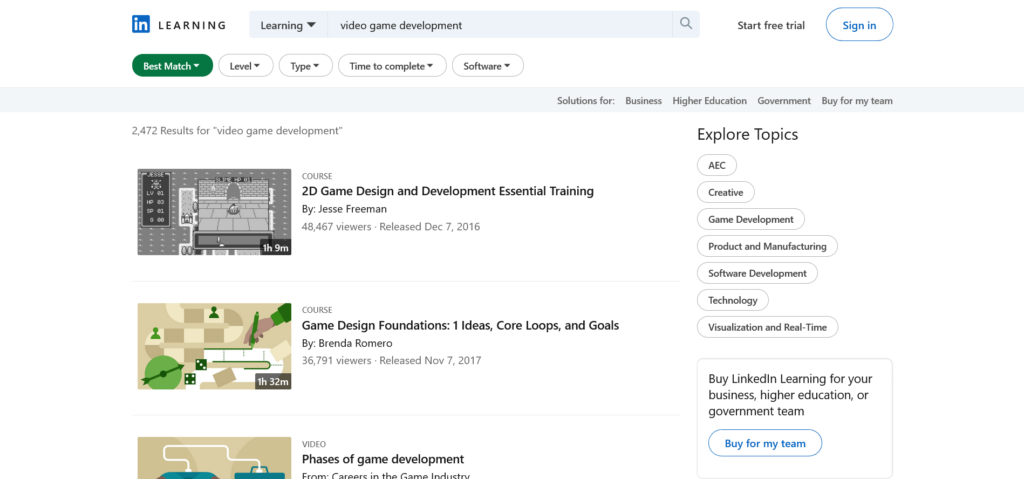
LinkedIn Learning features an extensive library of video tutorials on various aspects of video game artistry. Taught by industry professionals, these courses cover everything from concept art to character design and animation. With the added advantage of LinkedIn integration, learners can showcase their newfound skills directly on their professional profiles.
Skillshare
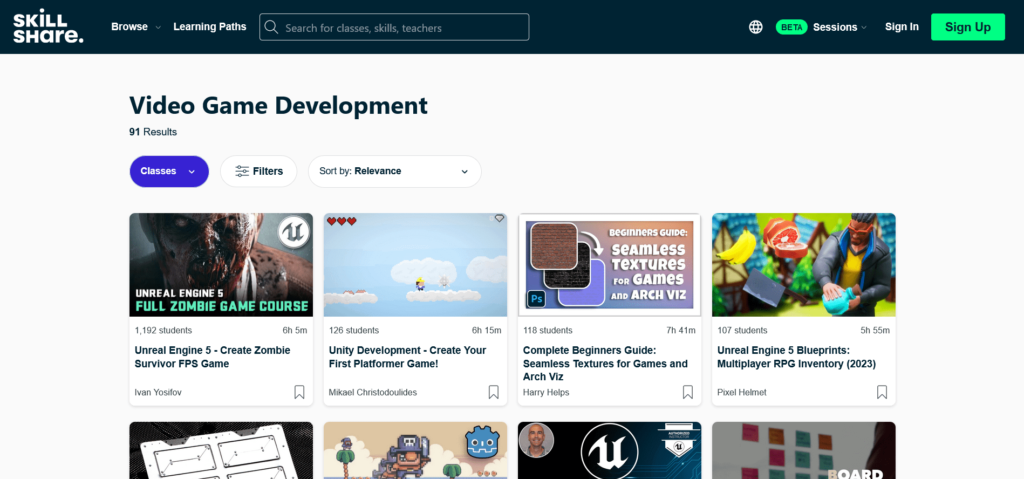
Skillshare is known for its project-based learning approach, allowing aspiring video game artists to immediately apply what they’ve learned. With classes on character design, environment art, and game development, Skillshare fosters a community of creatives who can share feedback and insights.
Pluralsight
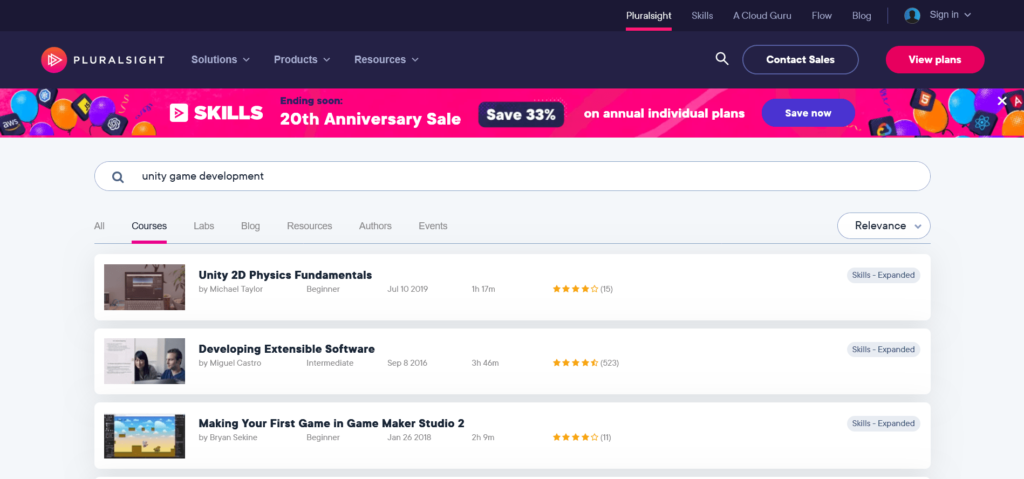
For those seeking a more technical approach to video game artistry, Pluralsight offers in-depth courses on 3D modeling, texturing, and animation. Geared towards the technical side of art, Pluralsight is an excellent choice for individuals looking to master the intricacies of the tools used in the industry.
Domestika
Domestika offers video game art courses taught by instructors from around the world. With a focus on creativity and artistic expression, Domestika’s courses cover various aspects of video game artistry, providing a global perspective on the industry.
The Top 10 Most Searched Questions and Answers About How to Become a Video Game Artist
1. What skills do I need to become a video game artist?
Becoming a video game artist requires a blend of artistic and technical skills. Master the basics of drawing, 3D modeling, texturing, and animation. Proficiency in digital art tools like Adobe Creative Suite, Autodesk Maya, or Blender is essential for bringing your creative visions to life.
2. Is a degree required to become a video game artist?
While a degree can be beneficial, it’s not a strict requirement. Many successful video game artists have honed their skills through self-learning, workshops, and online courses. However, a formal education in art, animation, or a related field can provide a structured learning environment and networking opportunities.
3. How do I build a portfolio as a video game artist?
Build a standout portfolio by showcasing a diverse range of your best works. Include concept art, character designs, environment art, and animations. Regularly update your portfolio to reflect your evolving skills and artistic growth.
4. What are some tips for getting noticed as a video game artist?
Actively promote your work on social media platforms, engage in online communities, attend gaming events, and seek feedback from peers and professionals. Networking and collaboration can help you stand out in the competitive world of video game artistry.
5. Are there any specific certifications or courses for video game artists?
While not mandatory, various online platforms offer courses in digital art, 3D modeling, and animation. Consider certifications from platforms like Coursera, Udemy, or LinkedIn Learning to enhance your skill set and boost your credibility.
6. What job titles are related to video game artistry?
Video game artistry encompasses various roles, including concept artist, character designer, environment artist, texture artist, animator, and technical artist. Explore these roles based on your interests and strengths.
7. How important is coding knowledge for video game artists?
While not always necessary, a basic understanding of coding, especially in languages like Python or C#, can be advantageous. It enhances your versatility, particularly if you’re interested in technical art or collaborating closely with developers.
8. What are the career prospects for video game artists?
The demand for video game artists is on the rise as the gaming industry continues to expand. Opportunities exist in game development studios, animation studios, advertising agencies, and freelance projects. With experience, you may advance to leadership roles or specialize in specific areas.
9. How do I prepare for a job interview as a video game artist?
Be ready to showcase your portfolio, discuss your creative process, and demonstrate your technical skills. Research the company, familiarize yourself with their games, and articulate how your artistic vision aligns with their projects.
10. What are some common challenges faced by video game artists?
Challenges may include tight deadlines, technical constraints, and adapting to project changes. Developing strong communication skills, staying adaptable, and continuous learning are crucial for overcoming these hurdles and thriving in the industry.
Expert Answers to the Top 10 Common Video Game Artists Interview Questions
1. Can you walk us through your portfolio and discuss your creative process?
Answer: Start by introducing your portfolio, highlighting diverse projects that showcase your versatility. Discuss your creative process, emphasizing your approach to concept development, design iterations, and final execution. Demonstrate how your artistic decisions align with the overall vision of the game.
2. What inspired you to pursue a career as a video game artist?
Answer: Share your passion for both art and gaming. Discuss specific games, artists, or experiences that ignited your interest in video game artistry. This question allows you to convey your genuine enthusiasm for the industry.
3. How do you stay updated on industry trends and incorporate them into your work?
Answer: Mention your commitment to continuous learning. Highlight your engagement with industry blogs, forums, conferences, and the exploration of new tools and techniques. Emphasize your adaptability and eagerness to integrate the latest trends into your artistic repertoire.
4. Describe a challenging project you’ve worked on and how you overcame obstacles.
Answer: Choose a project that illustrates both your skills and problem-solving abilities. Detail the challenges faced, the actions you took to address them, and the positive outcomes. This showcases your resilience and ability to navigate complexities.
5. What software and tools are you proficient in for video game artistry?
Answer: List the industry-standard tools you’re proficient in, such as Adobe Creative Suite, Autodesk Maya, ZBrush, or Blender. Highlight any additional software or plugins relevant to your specialization. Express your eagerness to adapt to new tools as technology evolves.
6. How do you collaborate with other members of a game development team?
Answer: Stress the importance of collaboration in creating a cohesive gaming experience. Discuss your experience working with designers, animators, and developers. Emphasize effective communication, openness to feedback, and your ability to align your artistic vision with the overall game design.
7. What role does storytelling play in your artwork, and how do you convey narrative through visuals?Answer: Art in video games often contributes to storytelling. Discuss how you integrate narrative elements into your designs, whether through character expressions, environmental storytelling, or the overall mood of your artwork. Provide specific examples from your portfolio.
8. How do you handle tight deadlines and prioritize tasks in a fast-paced environment?Answer: Illustrate your time management skills and ability to thrive under pressure. Share experiences where you successfully met deadlines, highlighting your organization, adaptability, and efficiency in handling multiple tasks simultaneously.
9. What do you believe are the current challenges or trends in the video game industry, and how do you navigate them as an artist?
Answer: Demonstrate your industry awareness by discussing current challenges or trends. Address how you adapt your artistic approach to meet these challenges, emphasizing your ability to stay ahead of the curve and contribute to the industry’s evolution.
10. Where do you see the future of video game artistry, and how do you plan to contribute to it?
Answer: Showcase your forward-thinking mindset. Discuss emerging technologies, art styles, or platforms you anticipate will shape the future of video game artistry. Articulate how you plan to stay at the forefront of these developments and contribute your unique perspective and skills to the industry.
Mastering most common job interview questions for video game artists requires a combination of industry knowledge, artistic prowess, and effective communication. By preparing thoughtful and tailored responses to these questions, you’ll be well-equipped to impress potential employers and confidently navigate your way to a successful career in the dynamic world of video game artistry.
Two Example Resumes for a Video Game Artist With Different Levels of Experience
Example 1: Entry-Level Video Game Artist Resume
[Your Name]
[Your Address]
[Your City, State, Zip Code]
[Your Phone Number]
[Your Email Address]
Objective: Passionate and creative recent graduate with a Bachelor’s degree in Digital Art seeking an entry-level position as a Video Game Artist. Eager to apply artistic skills and technical knowledge to contribute to the development of immersive and visually stunning gaming experiences.
Education:
Bachelor of Fine Arts in Digital Art [University Name], [Location] Graduated: [Month, Year]
Skills:
- Proficient in Adobe Creative Suite (Photoshop, Illustrator)
- Strong foundation in 3D modeling and texturing using Autodesk Maya
- Experience with game engines such as Unity and Unreal Engine
- Knowledge of character design, concept art, and environment art
- Familiarity with animation principles and techniques
- Excellent communication and teamwork skills
Portfolio: [Link to online portfolio showcasing artwork and projects]
Experience:
Digital Art Intern [Company Name], [Location] [Month, Year] – [Month, Year]
- Assisted senior artists in creating concept art, character designs, and environment assets for mobile game projects.
- Contributed to brainstorming sessions and provided creative input for game development.
- Collaborated with the development team to ensure art assets met technical requirements and integrated seamlessly into the game.
Projects:
- Designed and created a 3D character model for a fantasy-themed game project, including texturing and rigging.
- Developed concept art and visual style guide for an original game concept, incorporating feedback from the creative team.
Certifications:
- Certificate in Game Design Fundamentals, [Online Learning Platform]
Example 2: Experienced Video Game Artist Resume
[Your Name]
[Your Address]
[Your City, State, Zip Code]
[Your Phone Number]
[Your Email Address]
Objective: Creative and seasoned Video Game Artist with over [X] years of experience in the gaming industry. Proven track record of delivering high-quality art assets for AAA game titles. Seeking a challenging role where I can leverage my skills and expertise to contribute to innovative game projects.
Education:
Bachelor of Fine Arts in Digital Art [University Name], [Location] Graduated: [Month, Year]
Skills:
- Expert proficiency in Adobe Creative Suite (Photoshop, Illustrator) and Autodesk Maya
- Strong understanding of 3D modeling, texturing, and animation techniques
- Extensive experience with game engines such as Unity and Unreal Engine
- Skilled in character design, concept art, and environmental storytelling
- Excellent problem-solving and time management abilities
- Proven ability to work effectively in a collaborative team environment
Portfolio: [Link to online portfolio showcasing a selection of projects and artwork]
Experience:
Senior Video Game Artist [Game Development Studio], [Location] [Month, Year] – Present
- Led a team of artists in the creation of visually stunning art assets for multiple AAA game titles.
- Collaborated closely with game designers and developers to ensure artistic vision aligned with gameplay mechanics and narrative.
- Mentored junior artists, providing guidance on best practices and fostering a culture of creativity and excellence.
Previous Experience: [List any relevant previous positions with key responsibilities and achievements]
Projects:
- Played a key role in the development of [Game Title], contributing concept art, character designs, and environmental assets that received critical acclaim.
- Led the art direction for [Project Name], overseeing the creation of art assets from initial concept to final implementation.
Certifications:
- Certificate in Advanced 3D Modeling, [Online Learning Platform]
These example resumes showcase different levels of experience, emphasizing skills, projects, and achievements relevant to the field of video game design.
Conclusion
Becoming a video game artist is a rewarding journey that requires dedication, skill development, and a passion for both art and gaming. By following these comprehensive steps, aspiring artists can set themselves on the path to success, creating visually captivating worlds that captivate players and leave a lasting impact on the ever-expanding landscape of video games.

